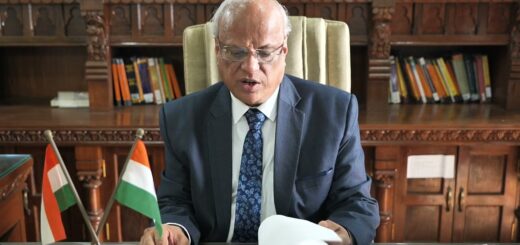Civil and Criminal Cases Can Proceed Simultaneously

Following are few case laws and citations which will help you to fight your case if you come across simultaneous Civil and Criminal proceedings.
———————————————————————–
Citations and Case Laws for Reference:
———————————————————————–
— 1 —
Similarly, in P.Swaroopa Rani vs. M. Hari Narayana @ Hari Babu, AIR 2008 SC 1884 Supreme Court observed that criminal proceedings and civil proceedings can proceed simultaneously and there was no statutory bar on two proceedings being conducted simultaneously.
— 2 —
In M.S. Sheriff and Anr. Vs. State of Madras and Ors., MANU/SC/0055/1954, rejecting the argument that simultaneous prosecution for perjury and the civil for damages for wrongful confinement would embarrass the accused and considering the question as to which of the proceedings should be stayed, the Apex Court while opining that as between the civil and criminal proceedings, the criminal matters should be given precedence, observed “that a civil suit often drags on for years and it is undesirable that a criminal prosecution should wait till everybody concerned has forgotten all about the crime. The public interests demand that criminal justice should be swift and sure; that the guilty should be punished while the events are still fresh in the public mind and that the innocent should be absolved as early as is consistent with a fair and impartial trial.’`
— 3 —
In fact, in the case of Syed Askari Hadi Ali Augustine Imam v. State (Delhi Admn.), (2009) 5 SCC 528, the Supreme Court has held that: “Indisputably, in a given case, a civil proceeding as also a criminal proceeding may proceed simultaneously. Cognizance in a criminal proceeding can be taken by the criminal court upon arriving at the satisfaction that there exists a prima facie case.”
— 4 —
In Iqbal Singh Marwah and Anr. vs. Meenakshi Marwah and Anr. AIR 2005 SC 2119, Supreme Court observed that both civil and criminal proceedings in respect of an incident can go ahead simultaneously. There is neither any statutory provision nor any legal principle that the findings recorded in one proceeding may be treated as final or binding in the other, as both the cases are to be decided on the basis of the evidence adduced therein.
— 5 —
In Criminal appeal no. 940 of 2009 (Devendra v. state of UP) decided on 6/5/9 the apex court held that: “There cannot, however, be any doubt or dispute whatsoever that in a given case a civil suit as also a criminal proceeding would be maintainable.They can run simultaneously. Result in one proceeding would not be binding on the court determining the issue before it in another proceeding.” In this case the court further held : “It is, therefore, evident that a misrepresentation from the very beginning is a sine qua non for constitution of an offence of cheating, although in some cases, an intention to cheat may develop at a later stage of formation of the contract.” Thus as the supreme court held in Devendra’s case, a distinction must be made between a civil wrong and a criminal wrong. When dispute between the parties constitute only a civil wrong and not a criminal wrong, the courts would not permit a person to be harassed although no case for taking cognizance of the offence has been made out.
— 6 —
In a recent decision in V.M. Shah Vs. State of Maharashtra and Anr., MANU/SC/0087/1996, the Supreme Court has reemphasised the need for giving preference to the criminal proceedings. 18. The settled principle of law, thus, is that there is no constitutional or legal bar or prohibition for both the civil as well as the criminal proceedings, to go on simultaneously. There is no rigid straight-jacket fixed formula for staying proceedings in a criminal case while civil proceedings are pending and it would depend on the facts of each case.
— 7 —
Dealing with the question whether the civil action namely, disciplinary proceedings for assaulting a supervisory officer should be stayed till the disposal of criminal case instituted against an employee, the Supreme Court in Kusheshwar Dubey Vs. M/s. Bharat Coking Coal Limited and Ors., MANU/SC/0246/1988, applying the ratio of its earlier decisions in Delhi Cloth and General Mills Ltd. Vs. Kushal Bhan MANU/SC/0228/1960, Tata Oil Mills Co. Ltd. Vs. Its Workmen MANU/SC/0206/1964, Jang Bahadur Singh Vs. Baij Nath Tiwari MANU/SC/0354/1968, held that there is no legal bar for simultaneous proceedings being taken, but the question whether in a particular case disciplinary proceedings should be interdicted pending criminal trial has to be decided in the facts and circumstances of each case and it is neither possible nor advisable to evolve any hard and fast, straight – jacket formula valid for all cases and of general application without regard to the particularities of the individual situation.








